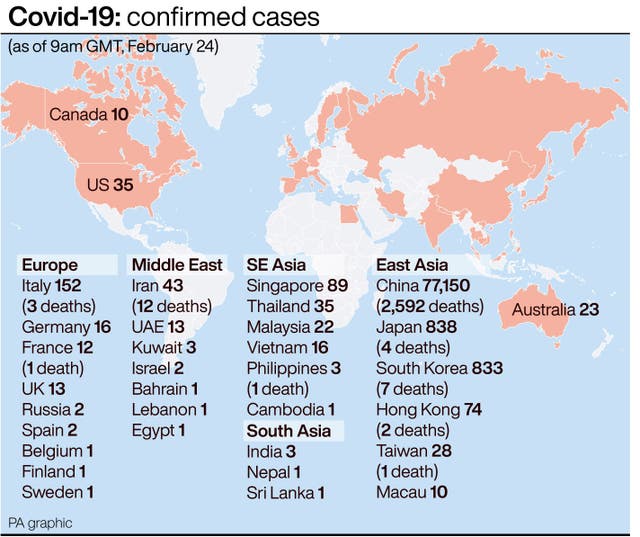
South Korea reported another large jump in new coronavirus cases on Monday, a day after the president called for “unprecedented, powerful” steps to combat the outbreak.
The 231 new cases bring South Korea’s total to 833, and two more deaths raise its toll to seven.
China also reported 409 new cases on Monday, raising the mainland’s total to 77,150 after a zigzag pattern of increases in recent days.
The 150 new deaths from the Covid-19 illness raised China’s total to 2,592 and showed a spike after hovering around 100 for four days. All but one death were in Hubei province, where the outbreak emerged in December.
Significant jumps in cases outside China have raised concern of the outbreak getting out of control. South Korea has the third highest national total behind China and Japan, and cases have rapidly increased in Italy and Iran in just a few days.

Most of Japan’s cases were from the Diamond Princess cruise ship, where nearly one-fifth of its 3,711 passengers and crew became infected.
More than 140 of South Korea’s new cases were in and near Daegu, the city of 2.5 million people where most of the country’s infections have occurred. Five of the seven deaths were linked to a hospital in Cheongdo, near Daegu, where a slew of infections were confirmed among patients in a psychiatric ward.
While officials have expressed hope they could contain the outbreak to the region surrounding Daegu, some experts noted signs of the virus circulating nationwide, pointing to a number of cases in the capital, Seoul, and elsewhere that were not immediately traceable.
“In Daegu, the number of new cases that are being confirmed by tests is quite large, and if we fail to effectively stem community transmissions in this area, there would be a large possibility (that the illness) spreads nationwide,” South Korean vice health minister Kim Gang-lip said, adding that the government aims to stabilise Daegu’s situation in four weeks.
He said that health officials plan to test all of the city’s residents exhibiting cold-like symptoms, which he said would be about 28,000 people. Health workers are also screening some 9,000 followers of the Daegu branch of the Shincheonji Church of Jesus, where a woman in her 60s attended two services before testing positive for the virus.
Of the country’s 161 new cases, 129 were related to the church. Officials are also investigating a possible link between churchgoers and the spike in infections at a hospital in nearby Cheongdo.

Meanwhile, authorities in Italy battled to contain Europe’s first major outbreak, while there were reports of 50 deaths in the Iranian city of Qom – the highest toll outside of China. Some of the clusters in recent days have no link to China.
Several countries reported cases connected to travel to Iran. Kuwait confirmed its first cases on Monday in three people who had travelled from Iran, and Bahrain reported its first case, also a traveller returning from Iran. The United Arab Emirates said new cases there included Iranian tourists.
A number of countries have closed their borders with Iran or effectively barred travellers from there, a similar step to the actions numerous countries have taken to ward off the spread of the illness from China.
On Monday, civil protection officials in Italy said 219 people had tested positive for the virus and five people had died, including two elderly men in northern Lombardy.
Police manned checkpoints around quarantined towns in Italy’s north while Italians travelling abroad were already feeling the effects of a crackdown, with a bus from Milan barricaded by police in the French city of Lyon for health checks and an arriving Alitalia plane blocked on the tarmac in the African island nation of Mauritius.
Alitalia said 40 passengers from Lombardy and Veneto were told they would only be allowed off if they went into quarantine locally, even though none complained of symptoms.
The Italian foreign ministry said it was working to provide “maximum assistance to Italians on board” and Alitalia said it was working to bring those refused entry back to Italy immediately.
Venice, which is full of tourists for carnival events, reported its first two cases.
As Italy scrambled to check the spread of the virus, authorities announced that all carnival events had been called off as well as major league football matches in the stricken region. Cinemas and theatres were also ordered shuttered, including Milan’s legendary La Scala.

Warning that China’s virus epidemic is “still grim and complex,” President Xi Jinping called for more efforts to stop the outbreak, revive industry and prevent the disease from disrupting spring planting of crops.
Mr Xi defended the ruling Communist Party’s response as “timely and effective” in a video conference with officials in charge of anti-disease work, according to the official Xinhua News Agency.
Meanwhile, a diplomatic row erupted after Israel turned back a South Korean airliner, underscoring fear and tensions over the outbreak.
A Korean Air flight with 188 passengers that landed at Tel Aviv’s Ben Gurion airport on Saturday evening was taxied away from the terminal while authorities allowed only 11 Israelis to enter the country. The plane returned to South Korea with the rest of the passengers on Sunday.


Comments: Our rules
We want our comments to be a lively and valuable part of our community - a place where readers can debate and engage with the most important local issues. The ability to comment on our stories is a privilege, not a right, however, and that privilege may be withdrawn if it is abused or misused.
Please report any comments that break our rules.
Read the rules hereLast Updated:
Report this comment Cancel